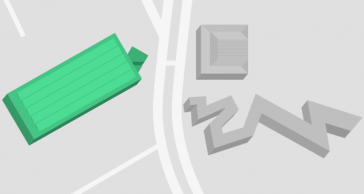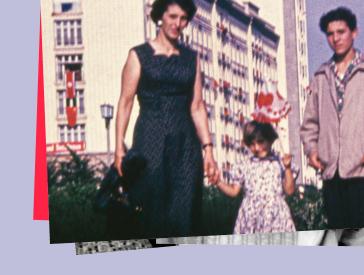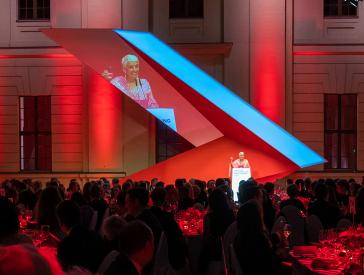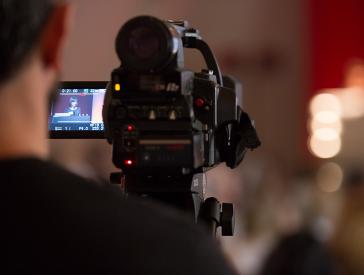“Schattmann” and the Representation of Jewish Experience in the Cinema of the GDR
Film marathon and book presentation with Lisa Schoß and Knut Elstermann (in German)

Die Bilder des Zeugen Schattmann (1): Der Freitagabend. 1972 (The pictures of the witness Schattmann (1): Friday evening. 1972)
As part of the Jewish Film Festival Berlin | Brandenburg (JFBB), the JMB will screen the entire four-part television film Die Bilder des Zeugen Schattmann (The Pictures of the Witness Schattmann) from 1971/1972, and present Lisa Schoß’s book Von verschiedenen Standpunkten. Die Darstellung jüdischer Erfahrung im Film der DDR (From Different Perspectives. The Representation of Jewish Experience in the Cinema of the GDR). This event is a preview of the exhibition Another Country. Jewish in the GDR, which will open at the JMB in September 2023.
Past event

Where
W. M. Blumenthal Academy
Fromet-und-Moses-Mendelssohn-Platz 1, 10969 Berlin
Postal address: Lindenstraße 9-14, 10969 Berlin
The Television Film
Die Bilder des Zeugen Schattmann, GDR 1971/1972, TV series, Director: Kurt Jung Alsen
The four-part television film Die Bilder des Zeugen Schattmann is based on the autobiographical novel of the same name by writer, painter and Auschwitz survivor Peter Edel. Alternating between different time periods, it tells the story of Frank Schattmann and his family – of the German-Jewish Berlin milieu, of experiencing discrimination and persecution, of politicization and resistance, torture, deportations, the concentration and extermination camps, of liberation and return, of the post-war years and life after surviving.
It is framed by the Globke trial (Globke was Chief of Staff of the German Chancellery under Adenauer), which the judiciary of the GDR conducted in absentia in 1963. The film is both extraordinary and characteristic of the GDR in its tension between ideological references and the very personal story of a survivor of the Shoah. Every time the US series Holocaust was aired on West German television, it was deliberately countered on GDR television with Schattmann – unlike in the FRG, no “help” was needed.
The Book
Lisa Schoß: Von verschiedenen Standpunkten. Die Darstellung jüdischer Erfahrung im Film der DDR (From Different Perspectives. The Representation of Jewish Experience in the Cinema of the GDR)
In retrospect, historians have attested that the GDR's greatest liability was its failure to come to terms with the Shoah – although, or perhaps precisely because, anti-fascism was its leading political discourse. In fact, until 1989, it was possible to talk about fascism and anti-fascism while simultaneously remaining silent about the crimes committed against the Jewish population (and other minorities). At the same time, a complex reckoning with Germany's crimes can be discerned in the art and culture of the GDR, including a multifaceted representation of Jewish experiences.
Lisa Schoß analyzes these experiences and in doing so, casts light on actors both in front of and behind the camera. For it was they who, using their own experiences and often in conflict with political ideology, added Jewish perspectives to the discourse on anti-fascism.

Book cover of Lisa Schoß: Von verschiedenen Standpunkten. Die Darstellung jüdischer Erfahrung im Film der DDR (From Different Perspectives. The Representation of Jewish Experience in the Cinema of the GDR); Verlag Bertz + Fischer
The Author
Lisa Schoß is a literary and cultural academic whose research is at the interface of Jewish studies and contemporary visual history. In 2020, she obtained her doctorate on the representation of Jewish experiences in DEFA feature films and GDR television productions. She works in partnership with the Selma Stern Center for Jewish Studies Berlin-Brandenburg as well as freelance.
In cooperation with the Jewish Film Festival Berlin | Brandenburg (JFBB) and the DEFA Foundation.
| 2– 3.30 pm |
film: Die Bilder des Zeugen Schattmann, Part 1 Der Freitagabend (Friday Evening) (78 mins) |
| 3.30– 4.30 pm |
book presentation: Lisa Schoß in conversation with Knut Elstermann |
| 5– 6.35 pm |
film: Die Bilder des Zeugen Schattmann, Part 2 Der Entschluss (The Decision) (92 mins) |
| 6.45– 8 pm |
film: Die Bilder des Zeugen Schattmann, Part 3 Die Wiederkehr (The Return) (72 mins) |
| 8.10 – 9.40 pm |
film: Die Bilder des Zeugen Schattmann, Part 4: Die Vorladung (The Summons) (87 mins) |

Cultural Summer at the Jewish Museum Berlin
- Landing Page
- Cultural Summer 2024: 14 Jul to 24 Aug 2024
- Events
- JMB summer party for EURO 2024 – 14 Jul 2024
- Jazz in the Garden mit Noëmi Waysfeld – 28 Jul 2024
- Jazz in the Garden mit Udi Shlomo – 11 Aug 2024
- Berlin Secrets – Let’s Talk about Sex! The Long Night of Museums 2024 – 24 Aug 2024
- Digital Content
- Boychiks in Berlin! Video recording of the evening of comedy with YidLife Crisis opening our Cultural Summer 2023
- Read the Signs: Video recording of an evening to mark the 70th anniversary of the Night of Murdered Poets, Cultural Summer 2022, in Yiddish and German
- Cultural Summer 2021: Video recordings
- Cultural Summer 2017: Audio and video recordings








